Analyzing Nursing Research for Evidence-Based Healthcare Practices
VerifiedAdded on 2023/06/10
|10
|3157
|454
Essay
AI Summary
This essay examines the role of research in informing nursing practices, focusing on evidence-based approaches to improve patient care. It analyzes two research papers: Harris et al. (2008), a quantitative study, and Keers et al. (2018), a qualitative study, using the Critical Appraisal Skills Program (CASP) to evaluate their methodologies and findings. The essay discusses the importance of PICO in research design, the need for blinding in RCTs, and the barriers to implementing evidence-based practices, including individual and organizational challenges. It highlights the significance of mixed-method research and ethical considerations, such as informed consent and participant debriefing. The analysis emphasizes how research findings contribute to autonomy, justice, beneficence, and non-maleficence in nursing, ultimately aiming to enhance healthcare quality and patient outcomes through the application of evidence-based practices.
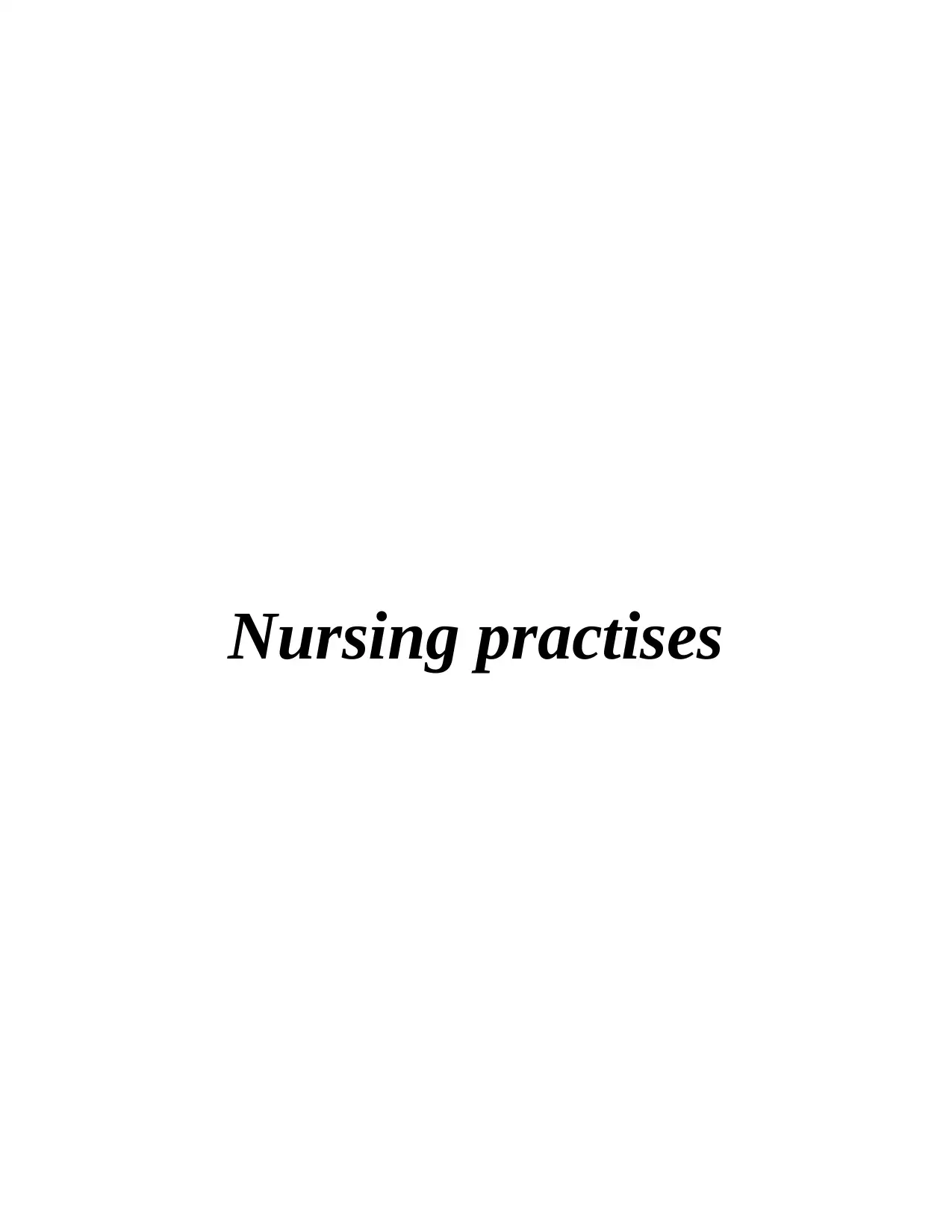
Nursing practises
Paraphrase This Document
Need a fresh take? Get an instant paraphrase of this document with our AI Paraphraser
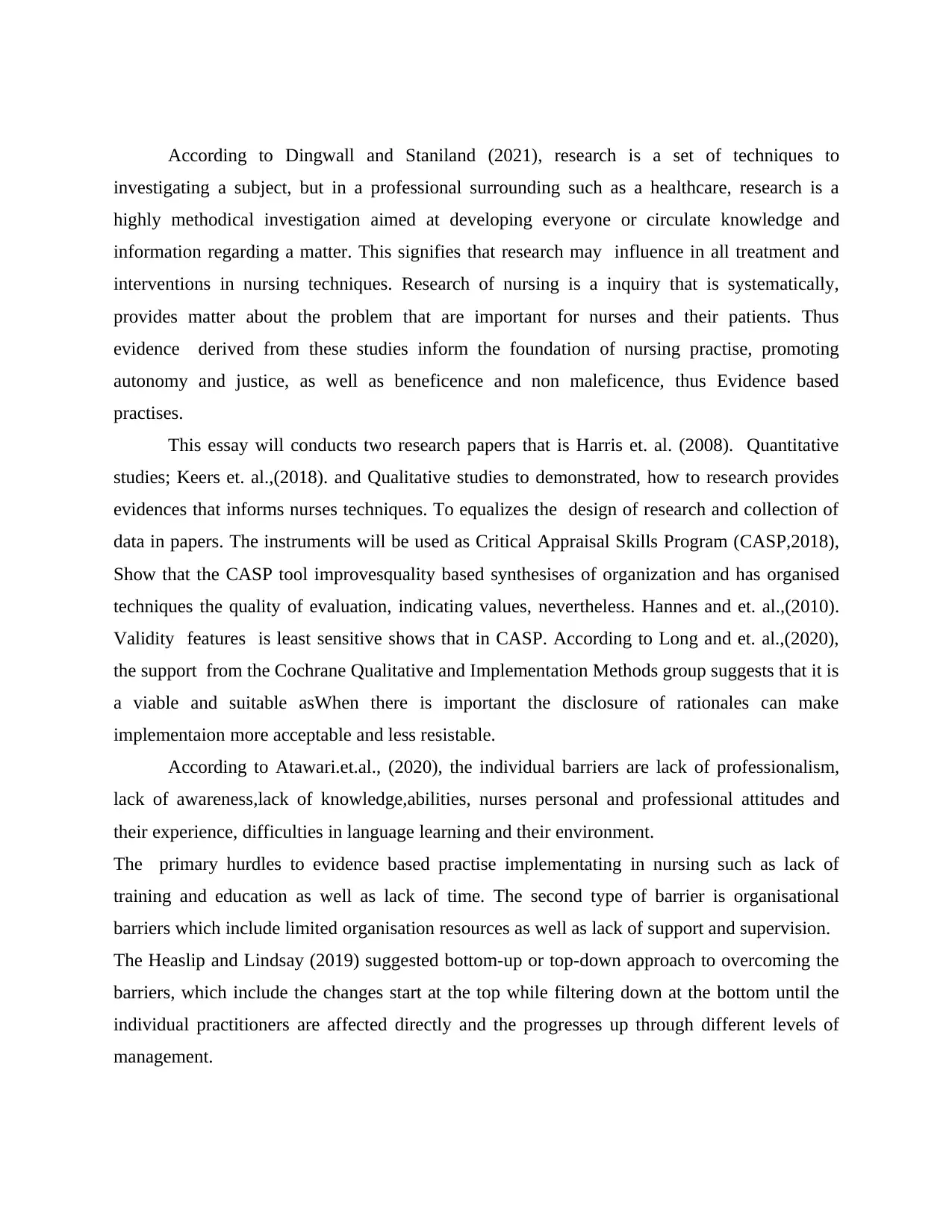
According to Dingwall and Staniland (2021), research is a set of techniques to
investigating a subject, but in a professional surrounding such as a healthcare, research is a
highly methodical investigation aimed at developing everyone or circulate knowledge and
information regarding a matter. This signifies that research may influence in all treatment and
interventions in nursing techniques. Research of nursing is a inquiry that is systematically,
provides matter about the problem that are important for nurses and their patients. Thus
evidence derived from these studies inform the foundation of nursing practise, promoting
autonomy and justice, as well as beneficence and non maleficence, thus Evidence based
practises.
This essay will conducts two research papers that is Harris et. al. (2008). Quantitative
studies; Keers et. al.,(2018). and Qualitative studies to demonstrated, how to research provides
evidences that informs nurses techniques. To equalizes the design of research and collection of
data in papers. The instruments will be used as Critical Appraisal Skills Program (CASP,2018),
Show that the CASP tool improvesquality based synthesises of organization and has organised
techniques the quality of evaluation, indicating values, nevertheless. Hannes and et. al.,(2010).
Validity features is least sensitive shows that in CASP. According to Long and et. al.,(2020),
the support from the Cochrane Qualitative and Implementation Methods group suggests that it is
a viable and suitable asWhen there is important the disclosure of rationales can make
implementaion more acceptable and less resistable.
According to Atawari.et.al., (2020), the individual barriers are lack of professionalism,
lack of awareness,lack of knowledge,abilities, nurses personal and professional attitudes and
their experience, difficulties in language learning and their environment.
The primary hurdles to evidence based practise implementating in nursing such as lack of
training and education as well as lack of time. The second type of barrier is organisational
barriers which include limited organisation resources as well as lack of support and supervision.
The Heaslip and Lindsay (2019) suggested bottom-up or top-down approach to overcoming the
barriers, which include the changes start at the top while filtering down at the bottom until the
individual practitioners are affected directly and the progresses up through different levels of
management.
investigating a subject, but in a professional surrounding such as a healthcare, research is a
highly methodical investigation aimed at developing everyone or circulate knowledge and
information regarding a matter. This signifies that research may influence in all treatment and
interventions in nursing techniques. Research of nursing is a inquiry that is systematically,
provides matter about the problem that are important for nurses and their patients. Thus
evidence derived from these studies inform the foundation of nursing practise, promoting
autonomy and justice, as well as beneficence and non maleficence, thus Evidence based
practises.
This essay will conducts two research papers that is Harris et. al. (2008). Quantitative
studies; Keers et. al.,(2018). and Qualitative studies to demonstrated, how to research provides
evidences that informs nurses techniques. To equalizes the design of research and collection of
data in papers. The instruments will be used as Critical Appraisal Skills Program (CASP,2018),
Show that the CASP tool improvesquality based synthesises of organization and has organised
techniques the quality of evaluation, indicating values, nevertheless. Hannes and et. al.,(2010).
Validity features is least sensitive shows that in CASP. According to Long and et. al.,(2020),
the support from the Cochrane Qualitative and Implementation Methods group suggests that it is
a viable and suitable asWhen there is important the disclosure of rationales can make
implementaion more acceptable and less resistable.
According to Atawari.et.al., (2020), the individual barriers are lack of professionalism,
lack of awareness,lack of knowledge,abilities, nurses personal and professional attitudes and
their experience, difficulties in language learning and their environment.
The primary hurdles to evidence based practise implementating in nursing such as lack of
training and education as well as lack of time. The second type of barrier is organisational
barriers which include limited organisation resources as well as lack of support and supervision.
The Heaslip and Lindsay (2019) suggested bottom-up or top-down approach to overcoming the
barriers, which include the changes start at the top while filtering down at the bottom until the
individual practitioners are affected directly and the progresses up through different levels of
management.
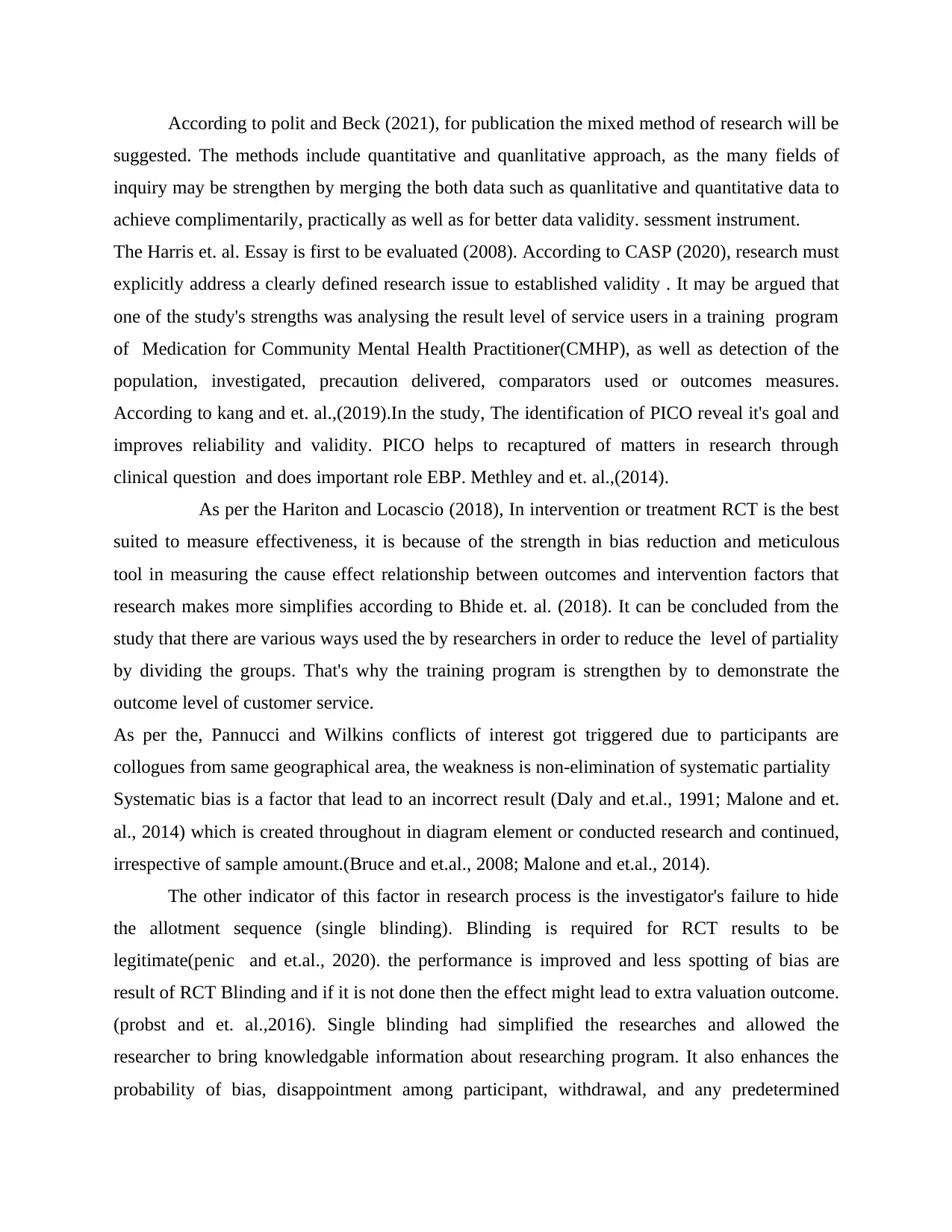
According to polit and Beck (2021), for publication the mixed method of research will be
suggested. The methods include quantitative and quanlitative approach, as the many fields of
inquiry may be strengthen by merging the both data such as quanlitative and quantitative data to
achieve complimentarily, practically as well as for better data validity. sessment instrument.
The Harris et. al. Essay is first to be evaluated (2008). According to CASP (2020), research must
explicitly address a clearly defined research issue to established validity . It may be argued that
one of the study's strengths was analysing the result level of service users in a training program
of Medication for Community Mental Health Practitioner(CMHP), as well as detection of the
population, investigated, precaution delivered, comparators used or outcomes measures.
According to kang and et. al.,(2019).In the study, The identification of PICO reveal it's goal and
improves reliability and validity. PICO helps to recaptured of matters in research through
clinical question and does important role EBP. Methley and et. al.,(2014).
As per the Hariton and Locascio (2018), In intervention or treatment RCT is the best
suited to measure effectiveness, it is because of the strength in bias reduction and meticulous
tool in measuring the cause effect relationship between outcomes and intervention factors that
research makes more simplifies according to Bhide et. al. (2018). It can be concluded from the
study that there are various ways used the by researchers in order to reduce the level of partiality
by dividing the groups. That's why the training program is strengthen by to demonstrate the
outcome level of customer service.
As per the, Pannucci and Wilkins conflicts of interest got triggered due to participants are
collogues from same geographical area, the weakness is non-elimination of systematic partiality
Systematic bias is a factor that lead to an incorrect result (Daly and et.al., 1991; Malone and et.
al., 2014) which is created throughout in diagram element or conducted research and continued,
irrespective of sample amount.(Bruce and et.al., 2008; Malone and et.al., 2014).
The other indicator of this factor in research process is the investigator's failure to hide
the allotment sequence (single blinding). Blinding is required for RCT results to be
legitimate(penic and et.al., 2020). the performance is improved and less spotting of bias are
result of RCT Blinding and if it is not done then the effect might lead to extra valuation outcome.
(probst and et. al.,2016). Single blinding had simplified the researches and allowed the
researcher to bring knowledgable information about researching program. It also enhances the
probability of bias, disappointment among participant, withdrawal, and any predetermined
suggested. The methods include quantitative and quanlitative approach, as the many fields of
inquiry may be strengthen by merging the both data such as quanlitative and quantitative data to
achieve complimentarily, practically as well as for better data validity. sessment instrument.
The Harris et. al. Essay is first to be evaluated (2008). According to CASP (2020), research must
explicitly address a clearly defined research issue to established validity . It may be argued that
one of the study's strengths was analysing the result level of service users in a training program
of Medication for Community Mental Health Practitioner(CMHP), as well as detection of the
population, investigated, precaution delivered, comparators used or outcomes measures.
According to kang and et. al.,(2019).In the study, The identification of PICO reveal it's goal and
improves reliability and validity. PICO helps to recaptured of matters in research through
clinical question and does important role EBP. Methley and et. al.,(2014).
As per the Hariton and Locascio (2018), In intervention or treatment RCT is the best
suited to measure effectiveness, it is because of the strength in bias reduction and meticulous
tool in measuring the cause effect relationship between outcomes and intervention factors that
research makes more simplifies according to Bhide et. al. (2018). It can be concluded from the
study that there are various ways used the by researchers in order to reduce the level of partiality
by dividing the groups. That's why the training program is strengthen by to demonstrate the
outcome level of customer service.
As per the, Pannucci and Wilkins conflicts of interest got triggered due to participants are
collogues from same geographical area, the weakness is non-elimination of systematic partiality
Systematic bias is a factor that lead to an incorrect result (Daly and et.al., 1991; Malone and et.
al., 2014) which is created throughout in diagram element or conducted research and continued,
irrespective of sample amount.(Bruce and et.al., 2008; Malone and et.al., 2014).
The other indicator of this factor in research process is the investigator's failure to hide
the allotment sequence (single blinding). Blinding is required for RCT results to be
legitimate(penic and et.al., 2020). the performance is improved and less spotting of bias are
result of RCT Blinding and if it is not done then the effect might lead to extra valuation outcome.
(probst and et. al.,2016). Single blinding had simplified the researches and allowed the
researcher to bring knowledgable information about researching program. It also enhances the
probability of bias, disappointment among participant, withdrawal, and any predetermined
⊘ This is a preview!⊘
Do you want full access?
Subscribe today to unlock all pages.

Trusted by 1+ million students worldwide
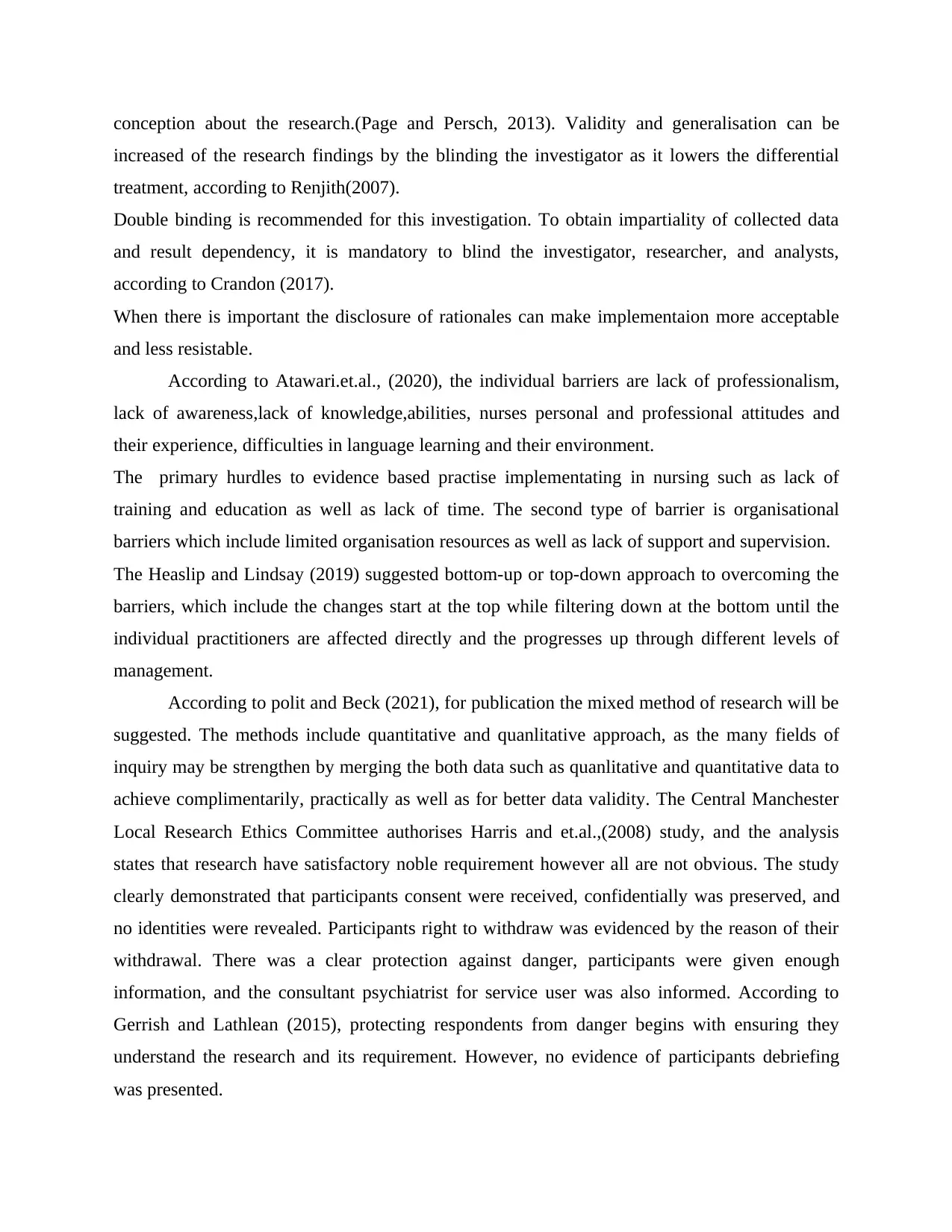
conception about the research.(Page and Persch, 2013). Validity and generalisation can be
increased of the research findings by the blinding the investigator as it lowers the differential
treatment, according to Renjith(2007).
Double binding is recommended for this investigation. To obtain impartiality of collected data
and result dependency, it is mandatory to blind the investigator, researcher, and analysts,
according to Crandon (2017).
When there is important the disclosure of rationales can make implementaion more acceptable
and less resistable.
According to Atawari.et.al., (2020), the individual barriers are lack of professionalism,
lack of awareness,lack of knowledge,abilities, nurses personal and professional attitudes and
their experience, difficulties in language learning and their environment.
The primary hurdles to evidence based practise implementating in nursing such as lack of
training and education as well as lack of time. The second type of barrier is organisational
barriers which include limited organisation resources as well as lack of support and supervision.
The Heaslip and Lindsay (2019) suggested bottom-up or top-down approach to overcoming the
barriers, which include the changes start at the top while filtering down at the bottom until the
individual practitioners are affected directly and the progresses up through different levels of
management.
According to polit and Beck (2021), for publication the mixed method of research will be
suggested. The methods include quantitative and quanlitative approach, as the many fields of
inquiry may be strengthen by merging the both data such as quanlitative and quantitative data to
achieve complimentarily, practically as well as for better data validity. The Central Manchester
Local Research Ethics Committee authorises Harris and et.al.,(2008) study, and the analysis
states that research have satisfactory noble requirement however all are not obvious. The study
clearly demonstrated that participants consent were received, confidentially was preserved, and
no identities were revealed. Participants right to withdraw was evidenced by the reason of their
withdrawal. There was a clear protection against danger, participants were given enough
information, and the consultant psychiatrist for service user was also informed. According to
Gerrish and Lathlean (2015), protecting respondents from danger begins with ensuring they
understand the research and its requirement. However, no evidence of participants debriefing
was presented.
increased of the research findings by the blinding the investigator as it lowers the differential
treatment, according to Renjith(2007).
Double binding is recommended for this investigation. To obtain impartiality of collected data
and result dependency, it is mandatory to blind the investigator, researcher, and analysts,
according to Crandon (2017).
When there is important the disclosure of rationales can make implementaion more acceptable
and less resistable.
According to Atawari.et.al., (2020), the individual barriers are lack of professionalism,
lack of awareness,lack of knowledge,abilities, nurses personal and professional attitudes and
their experience, difficulties in language learning and their environment.
The primary hurdles to evidence based practise implementating in nursing such as lack of
training and education as well as lack of time. The second type of barrier is organisational
barriers which include limited organisation resources as well as lack of support and supervision.
The Heaslip and Lindsay (2019) suggested bottom-up or top-down approach to overcoming the
barriers, which include the changes start at the top while filtering down at the bottom until the
individual practitioners are affected directly and the progresses up through different levels of
management.
According to polit and Beck (2021), for publication the mixed method of research will be
suggested. The methods include quantitative and quanlitative approach, as the many fields of
inquiry may be strengthen by merging the both data such as quanlitative and quantitative data to
achieve complimentarily, practically as well as for better data validity. The Central Manchester
Local Research Ethics Committee authorises Harris and et.al.,(2008) study, and the analysis
states that research have satisfactory noble requirement however all are not obvious. The study
clearly demonstrated that participants consent were received, confidentially was preserved, and
no identities were revealed. Participants right to withdraw was evidenced by the reason of their
withdrawal. There was a clear protection against danger, participants were given enough
information, and the consultant psychiatrist for service user was also informed. According to
Gerrish and Lathlean (2015), protecting respondents from danger begins with ensuring they
understand the research and its requirement. However, no evidence of participants debriefing
was presented.
Paraphrase This Document
Need a fresh take? Get an instant paraphrase of this document with our AI Paraphraser
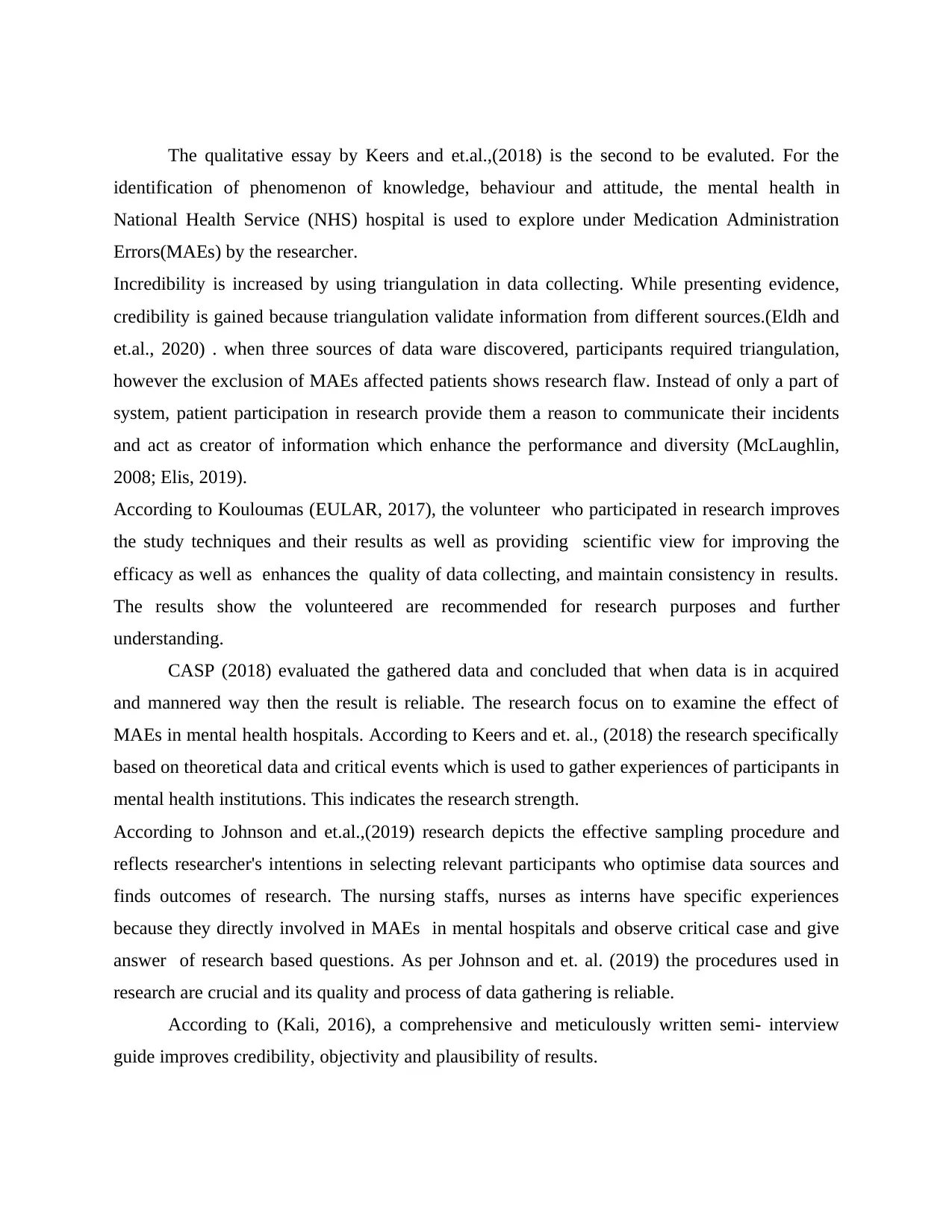
The qualitative essay by Keers and et.al.,(2018) is the second to be evaluted. For the
identification of phenomenon of knowledge, behaviour and attitude, the mental health in
National Health Service (NHS) hospital is used to explore under Medication Administration
Errors(MAEs) by the researcher.
Incredibility is increased by using triangulation in data collecting. While presenting evidence,
credibility is gained because triangulation validate information from different sources.(Eldh and
et.al., 2020) . when three sources of data ware discovered, participants required triangulation,
however the exclusion of MAEs affected patients shows research flaw. Instead of only a part of
system, patient participation in research provide them a reason to communicate their incidents
and act as creator of information which enhance the performance and diversity (McLaughlin,
2008; Elis, 2019).
According to Kouloumas (EULAR, 2017), the volunteer who participated in research improves
the study techniques and their results as well as providing scientific view for improving the
efficacy as well as enhances the quality of data collecting, and maintain consistency in results.
The results show the volunteered are recommended for research purposes and further
understanding.
CASP (2018) evaluated the gathered data and concluded that when data is in acquired
and mannered way then the result is reliable. The research focus on to examine the effect of
MAEs in mental health hospitals. According to Keers and et. al., (2018) the research specifically
based on theoretical data and critical events which is used to gather experiences of participants in
mental health institutions. This indicates the research strength.
According to Johnson and et.al.,(2019) research depicts the effective sampling procedure and
reflects researcher's intentions in selecting relevant participants who optimise data sources and
finds outcomes of research. The nursing staffs, nurses as interns have specific experiences
because they directly involved in MAEs in mental hospitals and observe critical case and give
answer of research based questions. As per Johnson and et. al. (2019) the procedures used in
research are crucial and its quality and process of data gathering is reliable.
According to (Kali, 2016), a comprehensive and meticulously written semi- interview
guide improves credibility, objectivity and plausibility of results.
identification of phenomenon of knowledge, behaviour and attitude, the mental health in
National Health Service (NHS) hospital is used to explore under Medication Administration
Errors(MAEs) by the researcher.
Incredibility is increased by using triangulation in data collecting. While presenting evidence,
credibility is gained because triangulation validate information from different sources.(Eldh and
et.al., 2020) . when three sources of data ware discovered, participants required triangulation,
however the exclusion of MAEs affected patients shows research flaw. Instead of only a part of
system, patient participation in research provide them a reason to communicate their incidents
and act as creator of information which enhance the performance and diversity (McLaughlin,
2008; Elis, 2019).
According to Kouloumas (EULAR, 2017), the volunteer who participated in research improves
the study techniques and their results as well as providing scientific view for improving the
efficacy as well as enhances the quality of data collecting, and maintain consistency in results.
The results show the volunteered are recommended for research purposes and further
understanding.
CASP (2018) evaluated the gathered data and concluded that when data is in acquired
and mannered way then the result is reliable. The research focus on to examine the effect of
MAEs in mental health hospitals. According to Keers and et. al., (2018) the research specifically
based on theoretical data and critical events which is used to gather experiences of participants in
mental health institutions. This indicates the research strength.
According to Johnson and et.al.,(2019) research depicts the effective sampling procedure and
reflects researcher's intentions in selecting relevant participants who optimise data sources and
finds outcomes of research. The nursing staffs, nurses as interns have specific experiences
because they directly involved in MAEs in mental hospitals and observe critical case and give
answer of research based questions. As per Johnson and et. al. (2019) the procedures used in
research are crucial and its quality and process of data gathering is reliable.
According to (Kali, 2016), a comprehensive and meticulously written semi- interview
guide improves credibility, objectivity and plausibility of results.
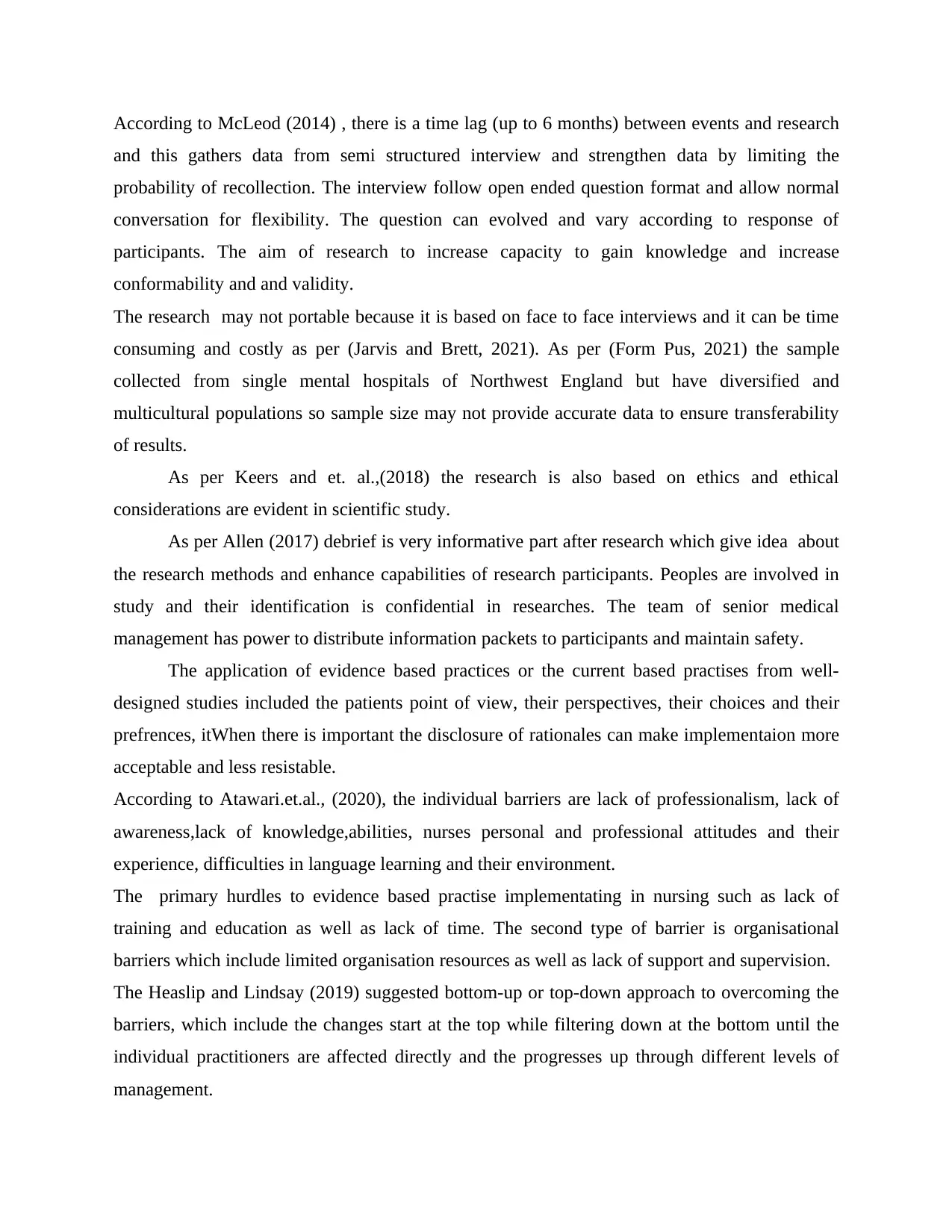
According to McLeod (2014) , there is a time lag (up to 6 months) between events and research
and this gathers data from semi structured interview and strengthen data by limiting the
probability of recollection. The interview follow open ended question format and allow normal
conversation for flexibility. The question can evolved and vary according to response of
participants. The aim of research to increase capacity to gain knowledge and increase
conformability and and validity.
The research may not portable because it is based on face to face interviews and it can be time
consuming and costly as per (Jarvis and Brett, 2021). As per (Form Pus, 2021) the sample
collected from single mental hospitals of Northwest England but have diversified and
multicultural populations so sample size may not provide accurate data to ensure transferability
of results.
As per Keers and et. al.,(2018) the research is also based on ethics and ethical
considerations are evident in scientific study.
As per Allen (2017) debrief is very informative part after research which give idea about
the research methods and enhance capabilities of research participants. Peoples are involved in
study and their identification is confidential in researches. The team of senior medical
management has power to distribute information packets to participants and maintain safety.
The application of evidence based practices or the current based practises from well-
designed studies included the patients point of view, their perspectives, their choices and their
prefrences, itWhen there is important the disclosure of rationales can make implementaion more
acceptable and less resistable.
According to Atawari.et.al., (2020), the individual barriers are lack of professionalism, lack of
awareness,lack of knowledge,abilities, nurses personal and professional attitudes and their
experience, difficulties in language learning and their environment.
The primary hurdles to evidence based practise implementating in nursing such as lack of
training and education as well as lack of time. The second type of barrier is organisational
barriers which include limited organisation resources as well as lack of support and supervision.
The Heaslip and Lindsay (2019) suggested bottom-up or top-down approach to overcoming the
barriers, which include the changes start at the top while filtering down at the bottom until the
individual practitioners are affected directly and the progresses up through different levels of
management.
and this gathers data from semi structured interview and strengthen data by limiting the
probability of recollection. The interview follow open ended question format and allow normal
conversation for flexibility. The question can evolved and vary according to response of
participants. The aim of research to increase capacity to gain knowledge and increase
conformability and and validity.
The research may not portable because it is based on face to face interviews and it can be time
consuming and costly as per (Jarvis and Brett, 2021). As per (Form Pus, 2021) the sample
collected from single mental hospitals of Northwest England but have diversified and
multicultural populations so sample size may not provide accurate data to ensure transferability
of results.
As per Keers and et. al.,(2018) the research is also based on ethics and ethical
considerations are evident in scientific study.
As per Allen (2017) debrief is very informative part after research which give idea about
the research methods and enhance capabilities of research participants. Peoples are involved in
study and their identification is confidential in researches. The team of senior medical
management has power to distribute information packets to participants and maintain safety.
The application of evidence based practices or the current based practises from well-
designed studies included the patients point of view, their perspectives, their choices and their
prefrences, itWhen there is important the disclosure of rationales can make implementaion more
acceptable and less resistable.
According to Atawari.et.al., (2020), the individual barriers are lack of professionalism, lack of
awareness,lack of knowledge,abilities, nurses personal and professional attitudes and their
experience, difficulties in language learning and their environment.
The primary hurdles to evidence based practise implementating in nursing such as lack of
training and education as well as lack of time. The second type of barrier is organisational
barriers which include limited organisation resources as well as lack of support and supervision.
The Heaslip and Lindsay (2019) suggested bottom-up or top-down approach to overcoming the
barriers, which include the changes start at the top while filtering down at the bottom until the
individual practitioners are affected directly and the progresses up through different levels of
management.
⊘ This is a preview!⊘
Do you want full access?
Subscribe today to unlock all pages.

Trusted by 1+ million students worldwide
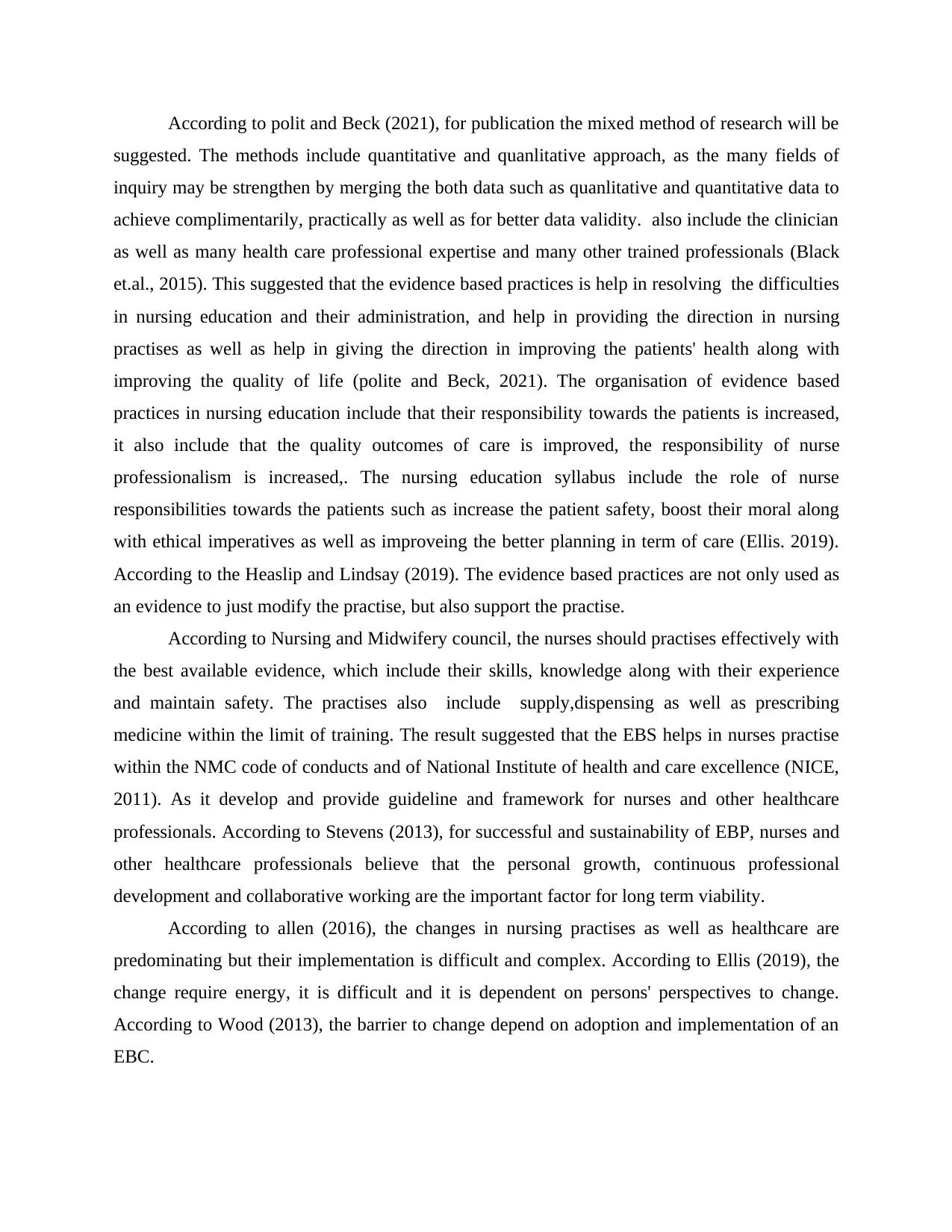
According to polit and Beck (2021), for publication the mixed method of research will be
suggested. The methods include quantitative and quanlitative approach, as the many fields of
inquiry may be strengthen by merging the both data such as quanlitative and quantitative data to
achieve complimentarily, practically as well as for better data validity. also include the clinician
as well as many health care professional expertise and many other trained professionals (Black
et.al., 2015). This suggested that the evidence based practices is help in resolving the difficulties
in nursing education and their administration, and help in providing the direction in nursing
practises as well as help in giving the direction in improving the patients' health along with
improving the quality of life (polite and Beck, 2021). The organisation of evidence based
practices in nursing education include that their responsibility towards the patients is increased,
it also include that the quality outcomes of care is improved, the responsibility of nurse
professionalism is increased,. The nursing education syllabus include the role of nurse
responsibilities towards the patients such as increase the patient safety, boost their moral along
with ethical imperatives as well as improveing the better planning in term of care (Ellis. 2019).
According to the Heaslip and Lindsay (2019). The evidence based practices are not only used as
an evidence to just modify the practise, but also support the practise.
According to Nursing and Midwifery council, the nurses should practises effectively with
the best available evidence, which include their skills, knowledge along with their experience
and maintain safety. The practises also include supply,dispensing as well as prescribing
medicine within the limit of training. The result suggested that the EBS helps in nurses practise
within the NMC code of conducts and of National Institute of health and care excellence (NICE,
2011). As it develop and provide guideline and framework for nurses and other healthcare
professionals. According to Stevens (2013), for successful and sustainability of EBP, nurses and
other healthcare professionals believe that the personal growth, continuous professional
development and collaborative working are the important factor for long term viability.
According to allen (2016), the changes in nursing practises as well as healthcare are
predominating but their implementation is difficult and complex. According to Ellis (2019), the
change require energy, it is difficult and it is dependent on persons' perspectives to change.
According to Wood (2013), the barrier to change depend on adoption and implementation of an
EBC.
suggested. The methods include quantitative and quanlitative approach, as the many fields of
inquiry may be strengthen by merging the both data such as quanlitative and quantitative data to
achieve complimentarily, practically as well as for better data validity. also include the clinician
as well as many health care professional expertise and many other trained professionals (Black
et.al., 2015). This suggested that the evidence based practices is help in resolving the difficulties
in nursing education and their administration, and help in providing the direction in nursing
practises as well as help in giving the direction in improving the patients' health along with
improving the quality of life (polite and Beck, 2021). The organisation of evidence based
practices in nursing education include that their responsibility towards the patients is increased,
it also include that the quality outcomes of care is improved, the responsibility of nurse
professionalism is increased,. The nursing education syllabus include the role of nurse
responsibilities towards the patients such as increase the patient safety, boost their moral along
with ethical imperatives as well as improveing the better planning in term of care (Ellis. 2019).
According to the Heaslip and Lindsay (2019). The evidence based practices are not only used as
an evidence to just modify the practise, but also support the practise.
According to Nursing and Midwifery council, the nurses should practises effectively with
the best available evidence, which include their skills, knowledge along with their experience
and maintain safety. The practises also include supply,dispensing as well as prescribing
medicine within the limit of training. The result suggested that the EBS helps in nurses practise
within the NMC code of conducts and of National Institute of health and care excellence (NICE,
2011). As it develop and provide guideline and framework for nurses and other healthcare
professionals. According to Stevens (2013), for successful and sustainability of EBP, nurses and
other healthcare professionals believe that the personal growth, continuous professional
development and collaborative working are the important factor for long term viability.
According to allen (2016), the changes in nursing practises as well as healthcare are
predominating but their implementation is difficult and complex. According to Ellis (2019), the
change require energy, it is difficult and it is dependent on persons' perspectives to change.
According to Wood (2013), the barrier to change depend on adoption and implementation of an
EBC.
Paraphrase This Document
Need a fresh take? Get an instant paraphrase of this document with our AI Paraphraser
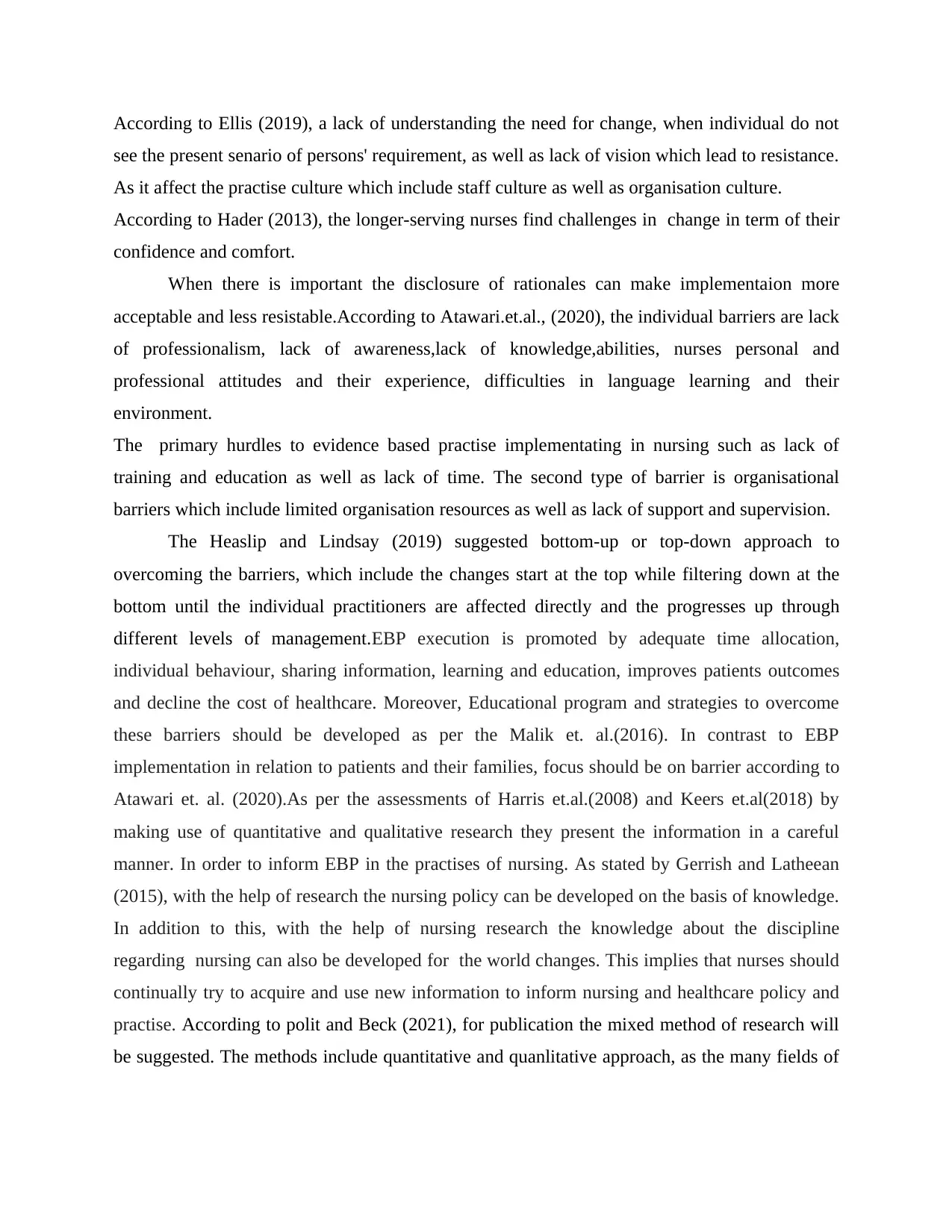
According to Ellis (2019), a lack of understanding the need for change, when individual do not
see the present senario of persons' requirement, as well as lack of vision which lead to resistance.
As it affect the practise culture which include staff culture as well as organisation culture.
According to Hader (2013), the longer-serving nurses find challenges in change in term of their
confidence and comfort.
When there is important the disclosure of rationales can make implementaion more
acceptable and less resistable.According to Atawari.et.al., (2020), the individual barriers are lack
of professionalism, lack of awareness,lack of knowledge,abilities, nurses personal and
professional attitudes and their experience, difficulties in language learning and their
environment.
The primary hurdles to evidence based practise implementating in nursing such as lack of
training and education as well as lack of time. The second type of barrier is organisational
barriers which include limited organisation resources as well as lack of support and supervision.
The Heaslip and Lindsay (2019) suggested bottom-up or top-down approach to
overcoming the barriers, which include the changes start at the top while filtering down at the
bottom until the individual practitioners are affected directly and the progresses up through
different levels of management.EBP execution is promoted by adequate time allocation,
individual behaviour, sharing information, learning and education, improves patients outcomes
and decline the cost of healthcare. Moreover, Educational program and strategies to overcome
these barriers should be developed as per the Malik et. al.(2016). In contrast to EBP
implementation in relation to patients and their families, focus should be on barrier according to
Atawari et. al. (2020).As per the assessments of Harris et.al.(2008) and Keers et.al(2018) by
making use of quantitative and qualitative research they present the information in a careful
manner. In order to inform EBP in the practises of nursing. As stated by Gerrish and Latheean
(2015), with the help of research the nursing policy can be developed on the basis of knowledge.
In addition to this, with the help of nursing research the knowledge about the discipline
regarding nursing can also be developed for the world changes. This implies that nurses should
continually try to acquire and use new information to inform nursing and healthcare policy and
practise. According to polit and Beck (2021), for publication the mixed method of research will
be suggested. The methods include quantitative and quanlitative approach, as the many fields of
see the present senario of persons' requirement, as well as lack of vision which lead to resistance.
As it affect the practise culture which include staff culture as well as organisation culture.
According to Hader (2013), the longer-serving nurses find challenges in change in term of their
confidence and comfort.
When there is important the disclosure of rationales can make implementaion more
acceptable and less resistable.According to Atawari.et.al., (2020), the individual barriers are lack
of professionalism, lack of awareness,lack of knowledge,abilities, nurses personal and
professional attitudes and their experience, difficulties in language learning and their
environment.
The primary hurdles to evidence based practise implementating in nursing such as lack of
training and education as well as lack of time. The second type of barrier is organisational
barriers which include limited organisation resources as well as lack of support and supervision.
The Heaslip and Lindsay (2019) suggested bottom-up or top-down approach to
overcoming the barriers, which include the changes start at the top while filtering down at the
bottom until the individual practitioners are affected directly and the progresses up through
different levels of management.EBP execution is promoted by adequate time allocation,
individual behaviour, sharing information, learning and education, improves patients outcomes
and decline the cost of healthcare. Moreover, Educational program and strategies to overcome
these barriers should be developed as per the Malik et. al.(2016). In contrast to EBP
implementation in relation to patients and their families, focus should be on barrier according to
Atawari et. al. (2020).As per the assessments of Harris et.al.(2008) and Keers et.al(2018) by
making use of quantitative and qualitative research they present the information in a careful
manner. In order to inform EBP in the practises of nursing. As stated by Gerrish and Latheean
(2015), with the help of research the nursing policy can be developed on the basis of knowledge.
In addition to this, with the help of nursing research the knowledge about the discipline
regarding nursing can also be developed for the world changes. This implies that nurses should
continually try to acquire and use new information to inform nursing and healthcare policy and
practise. According to polit and Beck (2021), for publication the mixed method of research will
be suggested. The methods include quantitative and quanlitative approach, as the many fields of

inquiry may be strengthen by merging the both data such as quanlitative and quantitative data to
achieve complimentarily, practically as well as for better data validity.
achieve complimentarily, practically as well as for better data validity.
⊘ This is a preview!⊘
Do you want full access?
Subscribe today to unlock all pages.

Trusted by 1+ million students worldwide

1 out of 10
Related Documents
Your All-in-One AI-Powered Toolkit for Academic Success.
+13062052269
info@desklib.com
Available 24*7 on WhatsApp / Email
![[object Object]](/_next/static/media/star-bottom.7253800d.svg)
Unlock your academic potential
Copyright © 2020–2026 A2Z Services. All Rights Reserved. Developed and managed by ZUCOL.





